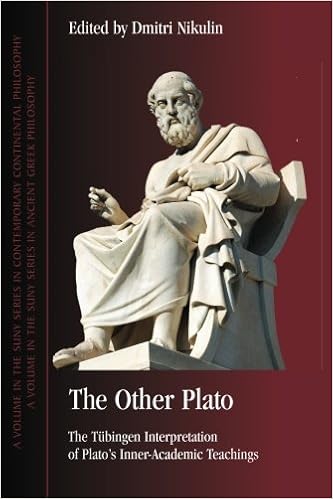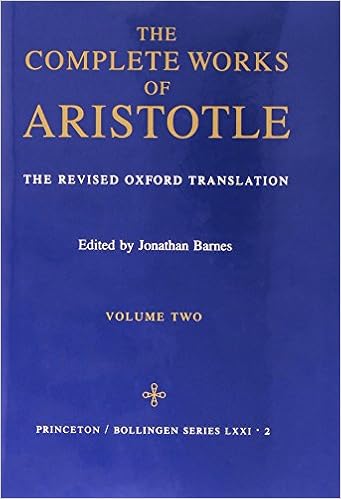
By Dmitri Nikulin
ISBN-10: 1438444095
ISBN-13: 9781438444093
ISBN-10: 1461918111
ISBN-13: 9781461918110
Supplying a provocative replacement to the dominant ways of Plato scholarship, the Tübingen institution means that the dialogues don't inform the total tale of Plato’s philosophical teachings. Texts and fragments via his scholars and their followers—most famously Aristotle’s Physics—point to an “unwritten doctrine” articulated by way of Plato on the Academy. those unwritten teachings had a extra systematic personality than these offered within the dialogues, which in accordance with this interpretation have been intended to be introductory. The Tübingen college reconstructs a old, serious, and systematic account of Plato that takes into consideration testimony approximately those teachings in addition to the dialogues themselves. the opposite Plato collects seminal and newer essays by way of best proponents of this technique, offering a entire assessment of the Tübingen institution for English readers.
Read or Download The Other Plato: The Tübingen Interpretation of Plato’s Inner-Academic Teachings PDF
Similar greek & roman books
Beginning of Knowledge by Hans-Georg Gadamer PDF
During this paintings Gadamer reminds us that philosophy for the Greeks was once not only a query of metaphysics and epistemology yet encompassed cosmology, physics, arithmetic, medication and the full achieve of theoretical interest and highbrow mastery. while Gadamer's booklet "The starting of Philosophy" handled the inception of philosophical inquiry, this booklet brings jointly the majority of his formerly released yet by no means translated essays at the Presocratics.
The Gorgias is a bright advent to crucial difficulties of ethical and political philosophy. In resolution to an eloquent assault on morality as conspiration of the susceptible opposed to the robust, Plato develops his personal doctrine, insisting that the advantages of being ethical continuously outweigh any advantages to be received from immorality.
New Essays on Ancient Pyrrhonism by Diego E. Machuca PDF
Scholarship on historic Pyrrhonism has made large advances during the last 3 a long time, thank you in particular to the cautious reexamination of Sextus Empiricus extant corpus. development in this momentum, the authors of the 8 essays amassed the following study essentially the most vexed and interesting exegetical and philosophical questions posed via Sextus presentation of this kind of skepticism.
Read e-book online The Complete Works of Aristotle (The Revised Oxford PDF
The Oxford Translation of Aristotle was once initially released in 12 volumes among 1912 and 1954. it truly is universally well-known because the typical English model of Aristotle. This revised variation includes the substance of the unique Translation, somewhat emended in mild of contemporary scholarship; 3 of the unique types were changed by means of new translations; and a brand new and enlarged collection of Fragments has been further.
- Unity, Identity, and Explanation in Aristotle's Metaphysics
- Descartes´ Philosophy of Nature
- Greek Sophists in the Roman Empire
- On the Natural Faculties (Loeb Classical Library)
- Laches
Additional info for The Other Plato: The Tübingen Interpretation of Plato’s Inner-Academic Teachings
Sample text
According to Krämer, the main thesis of Plato’s inner-Academic teaching is the identification of the one with the good: ἕν is ἀγαθόν. In the Republic (506D2–507A2, 509C1–11), Plato mentions the good rather than giving it a proper definition, which is left out of the debate. A development of the thesis that the good is the one is found, however, in Plato’s public lecture (ἀκρόασις) On the Good (Περὶ τἀγαθοῦ), which is different from a series of regular lectures delivered at the Academy of the same name (see Aristotle, Met.
The intermediate character of mathematical objects establishes an ontological structure of things that is complemented and paralleled by the epistemological structure of cognitive faculties (see Plato, Rep. 511D–E, 522C–526C). Thus, the ideal entities—ideal numbers and ideas—are subjects of non-discursive thinking (νόησις). The mathematicals (which include mathematical numbers [studied by arithmetic], lines and planes [geometry], solids [stereometry], and regular motions [astronomy]) are thought by discursive thinking (διάνοια).
That the cosmos in Plato is inherently geometrical and is structured according to a numerical pattern is supported by an interpretation of a passage from Plato’s Timaeus (36C–D), which supports the conclusion that the Platonic cosmos, although spherical and unique, in its entirety preserves Euclidean, and not elliptic, geometry, insofar as the cosmos can be taken as topologically equivalent to a torus (see Nikulin 2000, 113–118). Notably, point is absent in the geometrical sequence of solid–plane– line: because of its simplicity and partlessness, point always presents a difficulty for thinking for Plato and Xenocrates.
The Other Plato: The Tübingen Interpretation of Plato’s Inner-Academic Teachings by Dmitri Nikulin
by Christopher
4.0



